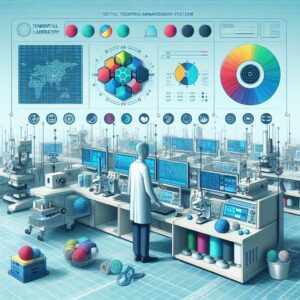Top 5 Textile Testing LIMS – Laboratory Information Management Systems
Here are the Top 5 Textile Testing LIMS Laboratory Information Management Systems tailored specifically for textile testing, focusing on handling the diverse range of tests performed in textile labs, including strength, durability, chemical composition, and color fastness:

1. Lyons Laboratory Management System LLMS LIMS
Overview:
Lyons Laboratory Management System is widely used for testing textiles due to its adaptability to industry-specific workflows. It supports a variety of textile testing processes, such as tensile strength, color fastness, and flammability.
Key Features:
- Integration with textile testing instruments
- Comprehensive data tracking for physical and chemical properties
- Standards compliance (ISO, ASTM, AATCC)
- Automated sample tracking and quality control
Best For:
Labs managing diverse textile testing protocols.
2.
Overview:
Matrix Gemini is highly customizable, making it suitable for textile testing labs with unique requirements. Its workflow designer allows labs to configure processes for various textile-specific tests.
Key Features:
- Visual workflow design tailored to textile testing
- Durability and environmental testing modules
- Sample traceability from receipt to reporting
- Regulatory compliance tracking
Best For:
Labs requiring bespoke solutions for textile testing workflows.
3.
Overview:
LabVantage offers powerful tools for textile laboratories, ensuring efficient management of testing processes like fabric weight, shrinkage, and abrasion resistance.
Key Features:
- Centralized storage for testing data and compliance records
- Easy integration with textile testing equipment
- Robust reporting and data analytics tools
- Scalability for labs of varying sizes
Best For:
Labs handling high volumes of textile samples with complex testing needs.
4. STARLIMS by Abbott Informatics
Overview:
STARLIMS is a versatile LIMS that supports a broad range of textile testing, including physical, chemical, and performance-based tests.
Key Features:
- Real-time monitoring of sample progress
- Automated workflows for standard textile tests (e.g., color fastness, pilling)
- Instrument integration and data capture automation
- Regulatory compliance support (ISO, ANSI, AATCC)
Best For:
Textile labs needing robust multi-method testing capabilities.
5. Bika Open Source LIMS
Overview:
Bika LIMS is an open-source platform offering flexibility and affordability, particularly suited to smaller textile labs or those with unique testing needs.
Key Features:
- Customizable workflows for textile testing
- Sample tracking and batch processing
- Support for physical and chemical test data
- Community-driven enhancements for ongoing development
Best For:
Cost-conscious labs that prioritize flexibility and customization.